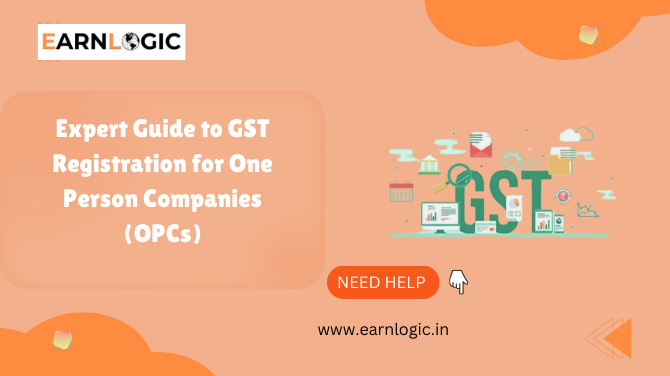GST registration is crucial for One Person Companies (OPCs) in India that engage in the sale of goods or services exceeding annual thresholds—Rs. 20 lakhs for services and Rs. 40 lakhs for goods. This registration helps OPCs comply with GST regulations, obtain a unique GST Identification Number (GSTIN), and facilitate seamless business operations under a unified tax system.
Overview of GST Registration
GST registration is required for companies with annual sales above Rs. 20 lakhs (Rs. 10 lakhs for special category states). This includes OPCs, a type of commercial enterprise established under the Companies Act of 2013, combining the roles of a sole entrepreneur and a limited liability entity.
Eligibility for GST Registration for OPCs:
- Annual turnover exceeding Rs. 20 lakhs (Rs. 10 lakhs for special states).
- Engaging in interstate supply of goods or services.
- Migrating from VAT, service tax, or excise if already registered.
- Exporting goods or services via e-commerce platforms.
GST Registration Procedure for OPCs:
- Visit the Official GST Portal: Select ‘Register Now’ under the ‘Taxpayers’ tab.
- New Registration: Enter required details and proceed.
- Temporary Reference Number (TRN): Note the TRN received after submission.
- Complete Registration: Use the TRN to log back in, verify details with the OTP received, and submit the application using Digital Signature Certificate (DSC).
- Receive ARN: An Application Reference Number (ARN) will be sent via email and SMS.
Required Documents for GST Registration:
- Aadhaar and PAN of the applicant and directors.
- PAN card of the company.
- Company registration certificate.
- Memorandum of Association (MoA) and Articles of Association (AoA).
- Photographs, bank statement or canceled cheque, proof of address.
- Proof of appointment of authorized signatory and no objection certificate if renting office space.
Checklist for GST Registration:
- Proof of Business Constitution: Certificate of Incorporation, MoA, AoA.
- Principal Place of Business: Address, official contacts, proof of premises.
- Bank Account Details: Bank statement, canceled cheque, passbook.
- Promoter Information: Personal details, DIN, PAN, Aadhaar, address.
- Authorized Signatory: Name, DIN (if applicable), PAN, Aadhaar, address.
- Other Documents: TCS details, proof of appointment of authorized signatory.
Steps for GST Registration:
- Login to the GST Portal.
- Complete Form GST REG-01: Both Part A and Part B.
- Upload Documents: In the required format.
- Verification: Forms and documents are reviewed by the officer.
- Issue of GSTIN: GSTIN and GST Certificate issued after form acceptance.
Benefits of GST Registration for OPCs:
- Reduced Compliance Burden: Simplifies the tax system, minimizes paperwork.
- Input Tax Credit (ITC): Allows claiming credits on tax paid, reducing liability and enhancing cash flow.
- Wider Business Scope: Facilitates national sales and market expansion.
- Enhanced Trustworthiness: Adds credibility as a registered business.
- Legal Recognition: Provides formal recognition and compliance assurance.
- Transparency and Compliance: Ensures accurate reporting and reduces legal risks.
- Tax Benefits: Access to tax benefits and deductions under GST.
Navigating GST Compliance: one person company must understand monthly and yearly compliance requirements, maintain proper records, and manage Input Tax Credit (ITC). Regular GST filings and adherence to GST laws are essential for effective operations.
Challenges and Solutions:
- Complex Regulations: Seek professional assistance to navigate legal requirements.
- Limited Resources: Use external resources and financial support.
- Lack of Experience: Educate yourself on business operations and legal requirements; engage in learning opportunities.
Conclusion:
GST registration is vital for OPCs in India to ensure compliance, benefit from tax credits, and establish credibility. Despite challenges, with professional guidance and continuous learning, OPCs can effectively manage the registration process and thrive in the competitive business environment.
